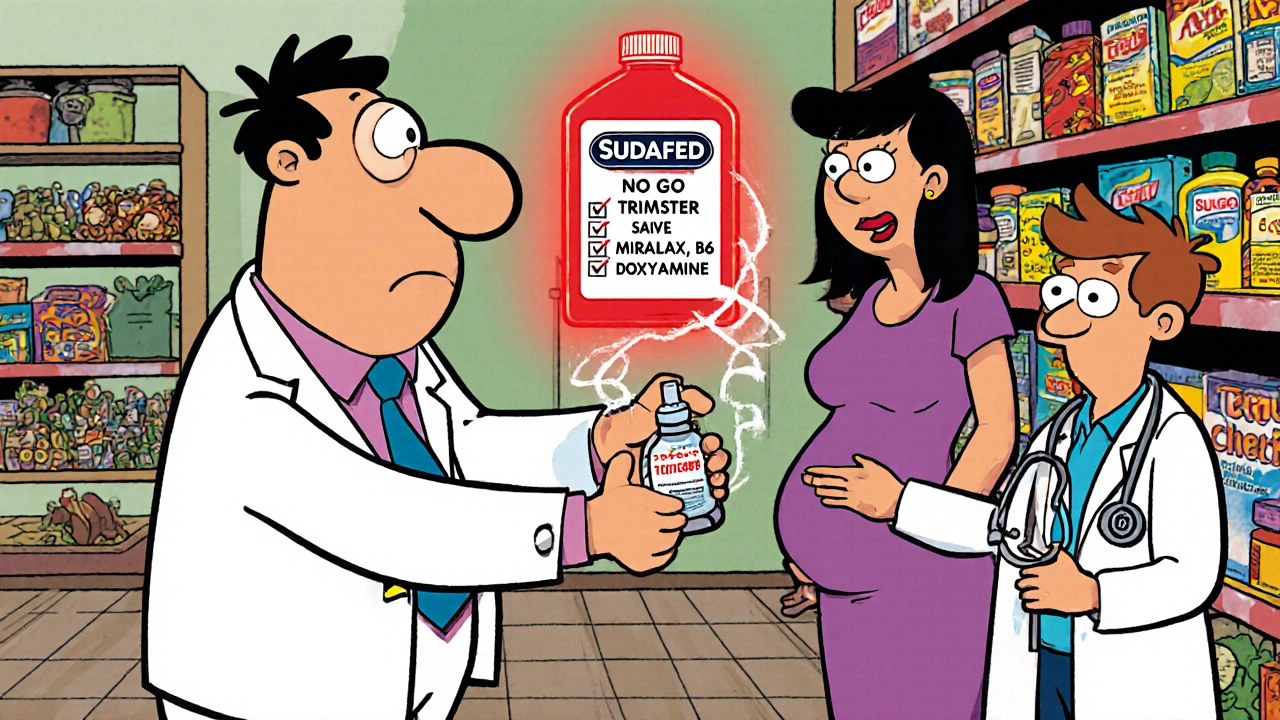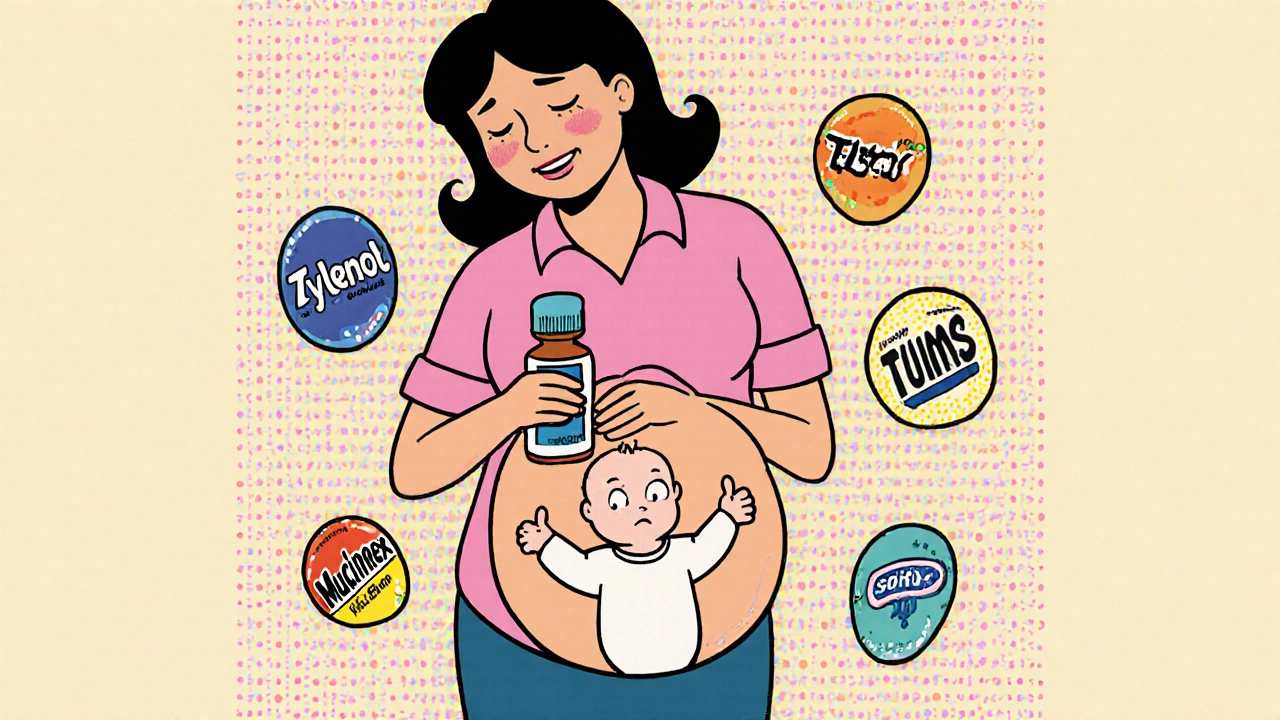When you’re pregnant, even a simple headache or runny nose can feel like a crisis. You want to feel better, but you’re terrified of hurting your baby. The truth is, medications safe during pregnancy do exist - and many are used every day by millions of expecting parents. But knowing which ones are truly safe isn’t as simple as reading a label. It’s about understanding dosages, timing, ingredients, and your own health history.
What Makes a Medication Safe During Pregnancy?
There’s no such thing as a 100% risk-free drug during pregnancy. Even water can be dangerous in extreme amounts. Safety isn’t about zero risk - it’s about risk that’s low enough to be outweighed by the benefit. The FDA stopped using the old A, B, C, D, X categories in 2015 because they were too vague. Now, drug labels give detailed summaries: what’s known from human studies, what’s suspected from animal data, and what’s still unknown. The big takeaway? If a medication has been studied in thousands of pregnant people over decades - and no pattern of birth defects or complications has emerged - it’s considered safe. That’s why some old, cheap, over-the-counter drugs are trusted more than newer, expensive ones.Safe Allergy Medications During Pregnancy
Allergies don’t take a break during pregnancy. Sneezing, itchy eyes, and nasal congestion are common. The good news? Several antihistamines have strong safety records.- Cetirizine (Zyrtec): 10 mg once daily. Used by over 100,000 pregnant people in the MotherToBaby registry with no increased risk of birth defects.
- Loratadine (Claritin): 10 mg once daily. Also well-studied. Avoid Claritin-D - it contains pseudoephedrine.
- Fexofenadine (Allegra): 180 mg once daily. Non-drowsy, and preferred over older antihistamines like Benadryl.
Cold, Cough, and Congestion Relief
You don’t need to suffer through a cold. But many multi-symptom cold medicines are dangerous because they combine ingredients you shouldn’t take.- Guaifenesin (Mucinex): Safe at standard doses. Only use plain versions - avoid products with decongestants or cough suppressants.
- Dextromethorphan (Robitussin DM): Up to 120 mg in 24 hours. Considered low risk in most studies.
- Saline nasal spray: Completely safe. Use as often as needed. It’s the best first-line treatment for congestion.
Pain Relief: What Works and What Doesn’t
Acetaminophen (Tylenol) is the gold standard for pain and fever during pregnancy. It’s been used safely by millions for decades.- Acetaminophen (Tylenol): Maximum 3,000 mg per day. That’s six 500 mg tablets. Don’t combine it with other products that contain acetaminophen - like cold medicines or Tylenol PM.

Heartburn and Digestive Issues
Heartburn is almost universal in pregnancy. So is constipation. Luckily, both are easy to manage safely.- Calcium carbonate (Tums): Safe and effective. Use as needed. But don’t overdo it - more than 1,500 mg of elemental calcium per day can cause constipation or kidney stones.
- Famotidine (Pepcid): 20 mg twice daily max. Reduces stomach acid without crossing the placenta in large amounts.
- Polyethylene glycol (Miralax): 17 g daily. The only stool softener recommended by most OB-GYNs. Safe, non-absorbed, and gentle.
Nausea and Morning Sickness
Nausea isn’t just uncomfortable - it can lead to dehydration and weight loss. The most effective, FDA-approved treatment is a combo you can buy over the counter.- Vitamin B6 (pyridoxine): 25 mg, three times daily.
- Doxylamine succinate (Unisom SleepTabs): 25 mg, up to three times daily.
What About Antidepressants and Other Prescriptions?
This is where things get complicated - and where fear often leads to dangerous choices. Many women stop their antidepressants when they get pregnant, thinking it’s safer. But stopping abruptly can trigger a relapse - and untreated depression carries its own risks: poor prenatal care, preterm birth, low birth weight.- Sertraline (Zoloft): The most studied SSRI in pregnancy. Still considered first-line. The FDA updated its warning in October 2023 about possible neonatal adaptation syndrome - but the risk is low, and benefits usually outweigh it.
- Fluoxetine (Prozac), citalopram (Celexa): Also used often. Data is less robust than sertraline, but still reassuring.

What You Should Avoid Completely
Some drugs are never okay during pregnancy. These include:- Isotretinoin (Accutane): Causes severe birth defects. Must be avoided before and during pregnancy.
- ACE inhibitors (Lisinopril, Enalapril): Can cause fetal kidney damage and low amniotic fluid.
- Warfarin (Coumadin): High risk of fetal bleeding and malformations.
- NSAIDs after 20 weeks: Already mentioned - but worth repeating.
- Herbal supplements: Chamomile, black cohosh, dong quai, goldenseal - many are unregulated and can trigger contractions or bleeding.
Real-Life Challenges: When Safety Gets Messy
Guidelines are clear - but real life isn’t. A woman in Texas got a sinus infection and her doctor said Sudafed was okay after the first trimester. Her pharmacist refused to sell it without extra paperwork. She went three days without relief. Another woman took too many Tums because she thought “more is better” - and ended up constipated for weeks. Many people stop necessary medications out of fear. One in four women in a 2022 survey quit their antidepressants. One in three took more than the recommended dose of Tums. One in five used a multi-symptom cold medicine without realizing it contained something dangerous. The gap between what’s known and what’s done is wide. That’s why your provider is your best tool. Don’t guess. Don’t rely on Reddit threads or Instagram advice. Ask for a printed list of safe meds from your OB-GYN’s office. Keep it in your wallet.How to Use This List
This isn’t a prescription. It’s a guide. Here’s how to use it:- Always check the active ingredient - not the brand name. Claritin = loratadine. Zyrtec = cetirizine.
- Read the label for dosage limits. More isn’t better.
- Avoid multi-symptom products. They’re full of hidden ingredients.
- Track your symptoms. If you need medication more than 2-3 days in a row, call your provider.
- When in doubt, call MotherToBaby at 1-866-626-6847. They’re free, confidential, and staffed by specialists.
Final Thought: You’re Not Alone
You’re not supposed to figure this out alone. Over 90% of pregnant people take at least one medication. Most do it safely. The key isn’t perfection - it’s awareness. You’re doing the right thing by asking these questions. Now use this list as a starting point, not the final word. Talk to your provider. Ask for the latest guidelines. And remember: taking care of yourself is the best way to take care of your baby.Is Tylenol really safe during pregnancy?
Yes, acetaminophen (Tylenol) is the safest pain reliever and fever reducer during pregnancy. The recommended maximum is 3,000 mg per day - that’s six 500 mg tablets. Avoid long-term daily use, especially in the third trimester, as emerging research suggests possible links to neurodevelopmental effects, though evidence is still inconclusive. Never exceed the daily limit, and avoid combination products like Tylenol PM that include sleep aids.
Can I take Benadryl for allergies or sleep while pregnant?
Diphenhydramine (Benadryl) is not linked to birth defects, but it’s no longer the first choice. Newer antihistamines like cetirizine (Zyrtec) and loratadine (Claritin) are more effective and cause less drowsiness. Benadryl can cross the placenta and may affect fetal brain development with frequent use. ACOG now recommends melatonin (1-3 mg) for occasional sleep issues instead. Use Benadryl only for short-term, occasional relief.
Is it safe to take Sudafed while pregnant?
Pseudoephedrine (Sudafed) should be avoided in the first trimester due to a small risk of abdominal birth defects. After the first trimester, some providers allow it if you don’t have high blood pressure or heart issues. However, it’s not universally recommended - many OB-GYNs prefer saline sprays or humidifiers. In some states, you need to show ID to buy it, and pharmacists may refuse to sell it without a provider note. Always check with your doctor first.
Can I take ibuprofen or Advil during pregnancy?
No - avoid ibuprofen, naproxen, and other NSAIDs after 20 weeks of pregnancy. These drugs can cause serious fetal kidney problems and reduce amniotic fluid levels, which can lead to complications. Before 20 weeks, occasional use may be okay for some women, but acetaminophen is always the safer choice. Never use NSAIDs long-term during pregnancy, even in early stages.
Are herbal teas and supplements safe during pregnancy?
No - most herbal supplements are not tested for safety in pregnancy. Chamomile, ginger (in high doses), black cohosh, dong quai, and goldenseal can trigger contractions, bleeding, or affect hormone levels. Even “natural” doesn’t mean safe. Stick to plain ginger tea (under 1 gram per day) for nausea, and avoid all other herbal products unless your provider approves them. Always check labels - many teas contain hidden herbs.
What should I do if I took a risky medication before I knew I was pregnant?
Don’t panic. Most medications taken in the first two weeks after conception either have no effect or cause an all-or-nothing outcome - meaning the pregnancy continues normally or ends in miscarriage. If you took something risky after that, call MotherToBaby at 1-866-626-6847. They specialize in pregnancy exposure questions and can help you understand your specific risk. Most exposures turn out to be low risk, and early consultation gives you peace of mind and better monitoring.
Is it safe to continue antidepressants during pregnancy?
For most women, yes. Stopping antidepressants increases the risk of relapse, which can lead to poor prenatal care, preterm birth, or low birth weight. Sertraline (Zoloft) is the most studied and safest SSRI in pregnancy. Fluoxetine and citalopram are also commonly used. Never stop your medication without talking to your provider. ACOG recommends continuing effective treatment when benefits outweigh risks - and for most women, that means staying on their medication.


Barry Sanders
Acetaminophen is fine, but everyone ignores the real issue: chronic use = higher autism risk. Studies are clear. You’re not ‘doing your best’ if you’re popping Tylenol daily for ‘stress headaches.’ Stop pretending it’s harmless.